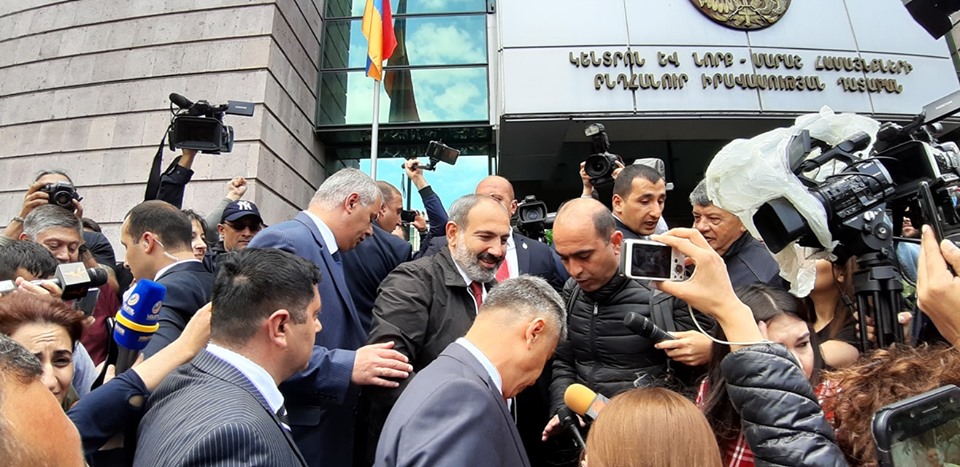
The demand for the reviewing and filtering of the judicial system in Armenia has become one of the most discussed topics.
The measure of restraint used on the second president of Armenia Robert Kocharyan, the arrest, change, the suspension of the March 1 case and sending it to the Constitutional Court as well as the Prime Minister’s appeal to close the proceedings of the court has caused a fierce reaction.
The laws are a swing, and those who sit on it are winners only if they can calculate the frequency of expected rotations, the possible rhythm and even the sudden chances of being blocked.
The Marc 1 case was so suddenly stopped that serious issues emerged. And the main issue is that the abrupt stop was not calculated, while both the prosecution and the defendant were already in the moving swing-court.
The delay of radical reforms in the judicial system raised a wave of bewilderment and even anger, provoked the emotions of people who have accepted the revolution of a year ago as a fact.
Generally, emotions emerge and are spread in that environment and around those questions where a lack of confidence is felt.
The mass media field received (and is receiving) such a stormy response, which together with the judicial system is one of the pillars of any government.
Unlike the media, however, the judicial system has been considered a closed, complex, underground communications arena since Soviet times. It did not work on the basis of public response, but far from the public reaction as a secret punitive machine.
From May 19, Armenian courts, judges and law enforcement officials have raised serious doubts that the chosen path is manageable, even if only for the reason that no steps have been taken to get rid of former semi-Soviet, corrupt practices.
Now the main emotional flows are stretching from the judicial system to the media.
The legal language and interpretation of laws have not allowed emotional reactions for years. And the media field is not only based on emotions but also provokes hem with all the power of manipulative tricks, spreading fear and instability among their audience.
The ticks of laws are of different quality: in order to use them, you need to be a professional. Journalism is the opposite: the professional is free from the use of obvious scheming tricks.
On May 21, we witnessed a small example of how the media field works, which, like the judicial system, is in need of serious self-cleaning.
The emotional background, which started from the PACE’s response to the Prime Minister’s call to organize protests in front of the courts and became deeper by the media.
And depending on who they are or who they are affiliated with, the news headlines and emphasis are selected.
“PACE monitors express concern at Prime Minister’s call to block courts,” says the title of Hraparak.
PACE has expressed concern to Pashinyan regarding his call to block courts,” wrote tert.am.
Predictably, 168hours had a similar title.
“PACE politicians urge to refrain from interfering with justice,” Panorama.am chose this part of the text.
“PACE responded negatively to Pashinyan’s call to block the entrance to the courts,” 1in.am titled its news.
“PACE urges Armenia to refrain from steps which may be perceived as being pressure on the judicial system,” Aravot expanded the negative response even more.
“We welcome Nikol Pashinyan’s statement on the reforms of the judicial system: PACE,” Haykakan Zhamanak quoted a completely different section in a predictable manner.
“PACE co-rapporteurs: The Prime Minister’s appeal is troubling, but judicial reforms are necessary,” wrote RFL/RE Azatutyun, trying to balance the message.
After the Velvet Revolution, it became apparent that the executive power refused to dictate its will to the judicial (the Prime Minister, therefore, turned to his only irreplaceable resource from which energy was received, the people.)
It also became clear that the judicial system is still not independent in its decisions and cannot solve the current problems.
Moreover, as well as news outlets, who can speak like judges, both unbiased and impartial, but actually they have their addresses and owners. And the addressee is not the public at all.
Nune Hakhverdyan
The views expressed in the column are those of the author's and do not necessarily reflect the views of Media.am.


Add new comment
Comments by Media.am readers become public after moderation. We urge our readers not to leave anonymous comments. It’s always nice to know with whom one is speaking.
We do not publish comments that contain profanities, non-normative lexicon, personal attacks or threats. We do not publish comments that spread hate.